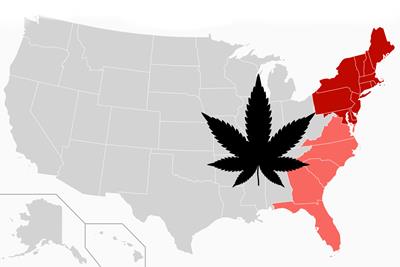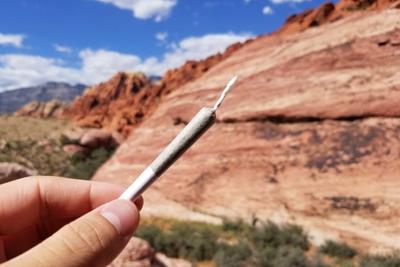
Saturday November 14, 2020
By Erin Hiatt
 Travel
Travel
It seems every election cycle finds cannabis legalization initiatives on ballots across the country, and 2020 was no exception. Voters in five states have passed cannabis initiatives, including Mississippi for medicinal consumption, South Dakota for both adult-use and medicinal, and Arizona, Montana, and New Jersey voters all voting on adult-use markets.
With states across the country in dire financial straits (largely due to COVID-19), cannabis legalization could provide a much-needed balm for depleted revenues, and bring in money from canna-tourists once it’s safe to travel and partake in cannabis events and activities again. Remember rallies like the Boston Freedom Rally and Seattle Hempfest? Remember puff, pass, paint, cooking, and yoga classes? Remember staying in that 420 friendly hotel and taking a local marijuana tour? Ah, the good ole days.
The East Coast as a Cannabis Destination
As it currently stands, people in the North Atlantic region of the U.S can consume and purchase cannabis in Maine and Massachusetts. Vermont is getting their recreational market up and running, while Washington DC continues with its “grow and give” model.

Now that New Jersey voters have passed Public Question 1, residents from the tri-state area that includes New Jersey, New York, and Connecticut (Pennsylvania should also be included since Philadelphia is a short 40-minute drive from Trenton) will very likely be drawn to the Garden State to make legal purchases once dispensaries are open. Let’s pretend for a few moments that tourism will be up and running in the near future. Will the east coast states experience a canna-tourism boom?
Cannabis Tourism in other parts of the United States
To learn more about how tourism might unfold along the east coast, let’s take a look at tourism in Colorado in the age of legal cannabis. The Colorado Tourism Office partnered with Strategic Marketing and Research Insights to learn how cannabis influences tourism in the state.
Overall, they found that 6.2% of visitors to Colorado said that legal cannabis was the main reason for their visit. If it wasn’t their primary reason for visiting, cannabis played a role in their activities. In the winter of 2018-2019, 16% of tourists said they visited a dispensary, and 15% of summer 2018 tourists said the same.

Another interesting find is the amount of time canna-tourists spent in Colorado. Travelers who visited the Centennial State for cannabis spent less time in the state than other tourists, 4.6 nights as opposed to 5.1. However, they spent more money than tourists not motivated by cannabis. Visitors who partook in cannabis activities during their stay spent $1,930 as opposed to $1,869. Tourists who said that cannabis was the primary reason for their visit spent even more, an average of $2,030.
Even though cannabis tourists may choose a specific location for the ganja, they’ve also have to eat. Tourists spend money in restaurants, hotels, retail stores, and local museums. They are large financial drivers for attractions like live entertainment and historical monuments, and (especially in Colorado) constitute a significant share of the traffic through state and national parks. All this adds up to a hefty tax bump outside of cannabis beyond the $6.56 billion that marijuana tax sales raked in for Colorado from 2014-2019.
What East Coast Tourism Might Look Like After COVID
While we can’t say with certainty that Colorado’s experience is directly applicable to the east coast, when COVID-19 isn’t a factor, New York City is the most visited city in the U.S. In 2017, visitors to New York City spent more than $44 billion, generated $12 billion in taxes, and supported 391,400 jobs related to tourism.
At a recent virtual press conference, New York Governor Andrew Cuomo was asked when the state would legalize cannabis. Cuomo’s blunt response was, “Soon, because now we need the money.”
He continued, “There are a lot of reasons to get this done, but one of the benefits is it also brings in revenue, and all states - but especially this state - we need revenue and we’re going to be searching the cupboards for revenue.”
New York does not have an adult-use initiative on the ballot this cycle, but New Jersey is a very quick commute across the Hudson River. In fact, prior to the onset of COVID-19 in March, around 500,000 residents of the two states commuted in and out. It’s safe to say that a lot of New Yorkers, Pennsylvanians, and Connecticuters will become “tourists” in the Garden State as soon as dispensaries open.
Current Northeastern Cannabis Markets As an Indicator
Though Massachusetts and Maine legalized adult-use cannabis several years ago, retail markets have been slow to roll out, making them a less reliable indicator of how a robust cannabis tourism sector could impact the local economy. There’s no evidence that lawmakers in New York and New Jersey won’t do the same, but judging how COVID-19 has so dramatically altered the financial landscape, expect a red carpet roll out as fast as they can manage.
How will the Northeast’s new cannabis landscape affect your travel plans after the pandemic? Tell all about it in the comments!







